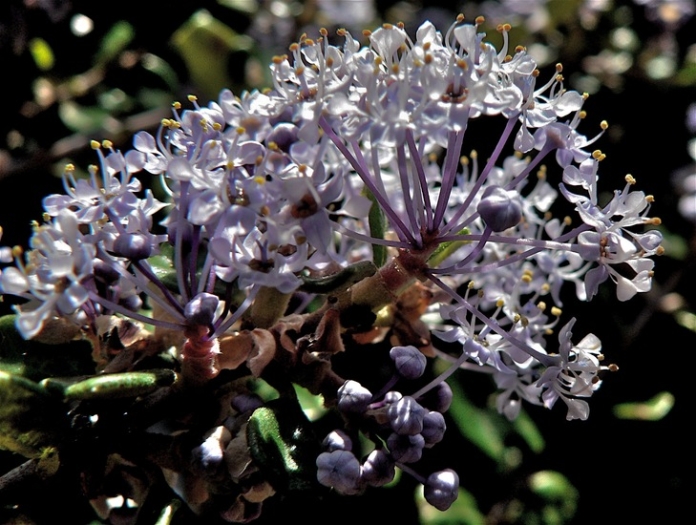Maritime Ceanothus
(Ceanothus maritimus)
Maritime Ceanothus (Ceanothus maritimus)
/
/

Jean Pawek
CC BY 3.0
Image By:
Jean Pawek
Recorded By:
Copyright:
CC BY 3.0
Copyright Notice:
Photo by: Jean Pawek | License Type: CC BY 3.0 | License URL: http://creativecommons.org/licenses/by/3.0/ | Attribution: 2015 Jean Pawek | Publisher: Calphotos |



















Estimated Native Range
Summary
Ceanothus maritimus, commonly known as Maritime Ceanothus, is an evergreen shrub native to the coastal sage scrub and chaparral of central California, particularly in the maritime influence zones. It is a low-growing, spreading or ascending shrub typically under 3 feet (1 meter) in height with reddish-gray bark that matures to a more uniform gray. The firm, evergreen leaves are oppositely arranged, each oval or oblong in shape with a pointed, flat, or notched tip, measuring under 0.8 inches (2 centimeters) long. They are shiny green on the upper surface and woolly underneath, with edges that curl under and are sometimes toothed. The inflorescence is a small cluster of deep blue to off-white flowers, blooming from late winter to early spring, which are highly attractive to bees and butterflies. The fruit is a rounded capsule about 0.24 inches (6 millimeters) long with tiny horns on top.
Maritime Ceanothus is valued for its drought tolerance, low maintenance requirements, and the ability to attract pollinators. It is often used in native plant gardens, xeriscaping, and as a ground cover or low hedge in coastal areas. It thrives in full sun but can tolerate partial shade, and prefers well-drained soils. While it is adapted to low-water conditions, occasional deep watering during dry periods can help maintain its vigor. It is important to avoid overwatering, as this can lead to root rot. Maritime Ceanothus is also appreciated for its resistance to pests and diseases, although it can be susceptible to fungal problems in poorly drained soils.CC BY-SA 4.0
Maritime Ceanothus is valued for its drought tolerance, low maintenance requirements, and the ability to attract pollinators. It is often used in native plant gardens, xeriscaping, and as a ground cover or low hedge in coastal areas. It thrives in full sun but can tolerate partial shade, and prefers well-drained soils. While it is adapted to low-water conditions, occasional deep watering during dry periods can help maintain its vigor. It is important to avoid overwatering, as this can lead to root rot. Maritime Ceanothus is also appreciated for its resistance to pests and diseases, although it can be susceptible to fungal problems in poorly drained soils.CC BY-SA 4.0
Plant Description
- Plant Type: Shrub
- Height: 2-3 feet
- Width: 4-6 feet
- Growth Rate: Moderate
- Flower Color: Blue
- Flowering Season: Spring
- Leaf Retention: Evergreen
Growth Requirements
- Sun: Full Sun, Part Shade
- Water: Low
- Drainage: Medium
Common Uses
Bank Stabilization, Bee Garden, Bird Garden, Butterfly Garden, Drought Tolerant, Erosion Control, Fragrant, Groundcover, Hedges, Hummingbird Garden, Low Maintenance, Salt Tolerant, Showy Flowers, Street Planting
Natural Habitat
Coastal sage scrub and chaparral of central California, particularly in maritime influence zones
Other Names
Common Names: Maritime California Lilac
Scientific Names: Ceanothus maritimus
GBIF Accepted Name: Ceanothus maritimus Hoover